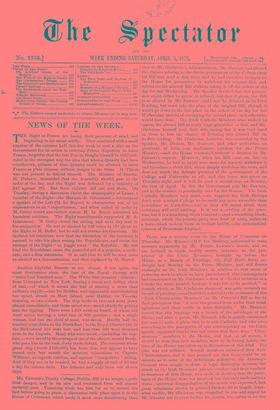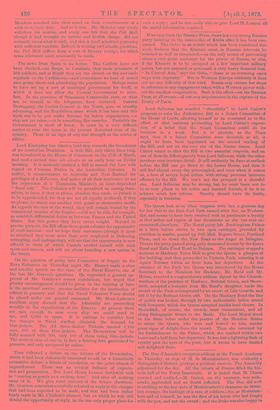There was a curious scene in the House of Commons
on Thursday. Mr. Munster (M.P. for Mallow), influenced in some measure apparently by Mr. Justice Lawson's severe, and we are inclined to think unduly severe, sentence on the pro- prietor of the Ulster Examiner, brought up before the House, as a Breach of Privilege, the Pall Mall's fierce on- slaught last Monday on the Prime Minister, and still fiercer onslaught on the Irish Members, in relation to that scene of yesterday week to which we have just referred. Our contemporary had commented on Mr. Gladstone's show of "fretful irritation at a rebuke the more painful, because it was felt to be merited,"--a remark which, as Mr. Gladstone observed, was quite certainly no breach of privilege,—and had then referred to the resistance of the "Irish Ultramontane Members" to Mr. Fawcett's Bill as due to their perception that "it cuts the ground from under their venal agitations and their traffic in noisy disloyalty." Mr. Munster moved that this language was a breach of the privileges of the House, and after a pause, Mr. Disraeli, who is greatly concerned just now to make it plain that he is anti-Catholic, and who owes something to the panegyrics of our contemporary on his Crisis speech, suggested that he was not aware that there were " Ultra- montane" members in the House, and that, at all events, it should be clear that such members were to be found, before the time of the House was taken up in discussions of this kind. The joke was not relished. Several members intimated they were Ultramontanes, and it was pointed out that there could be no mistake as to some of the individuals indicated ; the Attorney- General then sought to draw a legal distiuction between the attack on the Irish Members' private conduct and their conduct as members of that House, as a mode of showing that the privi- leges of the House were not involved, but this only made matters worse ; universal disapprobation of the article was expressed, but great reluctance shown to proceed further, till at length, some- what tardily, Mr. Gladstone was compelled to rise and appeal to Mr. Munster not to press further his motion, but rather to let the
Members attacked take their stand on their consciousness of a wish to do their duty. And so it was. , Mr. Munster very wisely withdrew his motion, and every one felt that the Pall Mull, though it had brought an untrue and foolish charge, did not seriously mean what it said ; and this it itself admitted yesterday with sufficient candour. Indeed, in 'writingon Catholic questions, the Pall Mall suffers from a sort of literary vertigo, for which some allowance must necessarily be made.



































